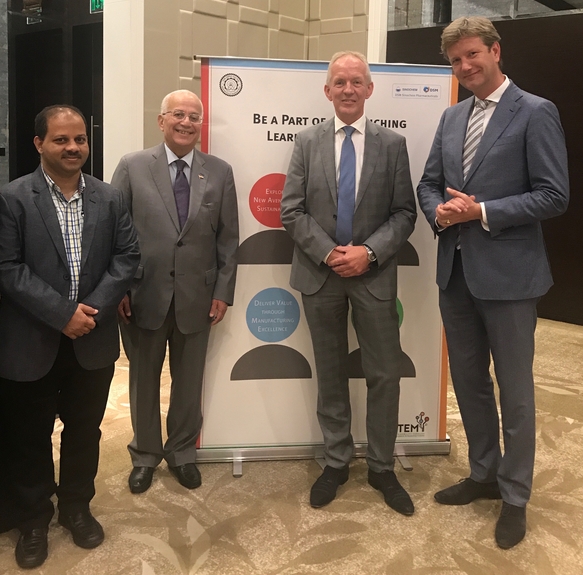
‘Anti-microbial resistance’ challenges discussed in Dubai to contain loss of US$100 trillion to global pharmaceutical industry by 2050
DSM Sinochem Pharmaceuticals in association with the Indian Institute of Technology (IIT) Delhi, organized a ‘Continuous Training Education (CTE)’ workshop in Dubai to train and educate industry stakeholders on the best practices within pharmaceutical manufacturing. The workshop had participants from across the Middle Eastern countries and other global pharmaceutical companies having their presence in UAE and the region.
The expected impact of antibiotic resistance by 2050, unless any urgent measures are taken, will be approximately US$100 trillion in lost output globally. This would also mean loss of close to 10 million lives every year by 2050 as a result of antibiotic resistance. Due to the seriousness of these challenges, the United Nations General Assembly (UNGA) has now placed ‘Anti-microbial Resistance’ (AMR) on its agenda.
UAE Government along with other countries in 2015 also initiated the 68th World Health Assembly Resolution for Global Action Plan on AMR with member states committing to developing National Action Plans by end of 2017.
Lucas Wiarda, Global Marketing Director and Head, Sustainable Antibiotics Program, DSP stated, “The Production of antibiotics comes with huge responsibility. Antibiotics save lives and we need to do everything possible to preserve the the effectiveness of existing antibiotics. Especially since the pipeline for new antibiotics and alternatives is still practically dry and it will take years of research before we can use them. The generic pharma industry can help fighting AMR in several ways: we can source responsibly made antibiotics, solve access issues, advocate responsible use, and of course we must comply with highest quality and regulatory requirements.”
“The emergence of antimicrobial resistance as a major public health issue is a cause of concern worldwide and the industry must stand up and take leadership. As one of the 13 global signatories to the UNGA Industrial roadmap to combat AMR and a member of the AMR Industry Alliance, we are committed to create awareness on the issue and advocate with key stakeholders including the industry, civil society, academia and think tanks. DSP aims to lift the quality, regulatory and environmental standards in the supply chain through initiatives such as STEM,” added Lucas.
According to reports, although non-prescription sale of antibiotics is illegal in the GCC states, a large number of pharmacies do still sell them without a prescription. The aim and objective of this session was to impart a certified Advance Training & Education Program to business associates and stakeholders from across the Middle East region and give updated knowledge to the technical pharmaceutical teams on developments in quality assessment and control, production, research and development, manufacturing techniques and sourcing for the pharmaceutical industry.
Pete Camper, Sales Director, DSP shared, “The pharmaceutical Industry worldwide is confronted with serious challenges of quality and regulatory requirements. The recent years have witnessed a clear call to the industry from various sectors to raise its bar on tackling the competitive market through responsible production mechanisms. The Continuous Training Education (CTE) program offers a good opportunity to reiterate our pledge to follow best practices during manufacturing and waste treatment of effluents to preserve and protect our environment.”
Speaking at the workshop, Prof. Anurag S. Rathore, Indian Institute of Technology, Delhi stated, “Healthcare globally faces two key challenges in affordability and quality. While affordability has been addressed at least in pharmaceuticals, quality is still a concern. An industry wide collaboration with academia where the costs and the benefits are shared, would be the ideal way to deal with the issue.”
These sessions also updated participants on quality by design techniques and case studies presented by Indian Institute of Technology experts. The key participants in the event included senior representatives and division heads from Manufacturing, R&D, quality control and assurance, purchase, and F&D departments in large- and medium-sized pharmaceutical industries based in the Middle East Region.
Present at the occasion, Dr. Omar El-Ahmady, R&D and Quality Director, Eipico Pharmaceuticals commented, “DSM Sinochem Pharmaceuticals organised a perfect CTE workshop with up to date scientific data. I am extremely honoured to be part of this confluence of top management of pharmaceutical industry and the scientific minds to discuss recent developments in the industry and hope for further such collaborations in the future.”
Researchers have also found that poor hand-hygiene compliance in hospitals and the region's large population of migrant workers could have contributed to the spread of antibiotic-resistant bacteria. According to a report, Antibiotic Resistance in the Middle East: Lessons Learned in the Prevention and Treatment of Multidrug-resistant Infections, weak compliance of healthcare professionals with standard infection control (IC) practices is a prime factor in some of the hospitals in Jordan, Syria and Iraq.


























